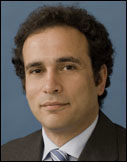Hamas’s recent victory in the Palestinian parliamentary elections highlights the deep crisis of secular Arabs. In two important 2005 elections in Egypt and Iraq, secular parties performed poorly. More than ten liberal and leftist parties in Egypt won only 4 percent of the vote, while the “banned” Muslim Brotherhood had the strongest showing of an opposition movement in the last three decades winning almost 15 percent of the vote. The Iraqi secular list of former prime minister Alawi could not convince more than a tenth of the population. Variations of the same theme can also be found in other Arab countries where elements of political pluralism exist. In Morocco, Yemen, and Kuwait, secular parties have lost much of their political relevance. Even in totalitarian settings, such as the Baath regime in Syria and Qaddafi’s rule in Libya, the only viable opposition to the dictators is religious.
In today’s Arab politics, secular parties have either degenerated into marginal forces with no broad popular support or become gatekeepers of repressive regimes. Three factors explain this situation.
First, since the 1950s the majority of Arab ruling elites have used secular ideologies to legitimate authoritarian states. The failure of these states to improve the living conditions of Arab majorities has resulted in popular disenchantment with secular currents and intensified the search for alternatives. Islamists have capitalized on this and offered the simple formula—“Islam is the solution”—drawing on an unreal yet appealing religious ideal.
Second, the conservative turn in the Arab world has added to the weakness of secular parties. Throughout the last three decades, a process of Islamization has unfolded in various vital social spheres. Education, media, community work, intellectual life, and even dress code have all grown more religious and created broad constituencies hostile to secular ideas.
And, third, secular parties in the opposition have had to endure subsequent waves of state repression. Although it is true that Islamists have also faced repression, they have been able to resort to their ultimate stronghold in society, the mosque, and use it to organize popular support or to sustain already existing constituencies. Secular parties, however, have completely lost contact with society. They have either deteriorated into closed debating circles or found a limited niche in the realm of urban-based, isolated nongovernmental organizations.
Recent democratic openings in Arab politics have reflected these political realities in two different ways. In countries such as Iraq and Palestine, religious movements have risen to power through the ballot box. In other places, Egypt for example, ruling elites have managed to contain Islamists with the traditional mix of repressive measures and election fraud. This presents the George W. Bush administration with a bitter choice. Either it chooses to side with authoritarian ruling elites in delaying democratization and risks losing its emerging credibility among Arab majorities who are beginning to believe in the sincerity of the American pursuit of democracy in the Middle East. Or it consents to public choice in the Arab world and accepts the rise of Islamist governments, with which it does have real differences over an array of issues and which might threaten U.S. interests in the Middle East.
Unfortunately, in the short run there is no way to get around this dilemma. Promoting secular parties to contest the dominance of Islamists is certainly a relevant option in the long run, but empowered secular Arabs simply will not be able to compete with Islamists in the coming years. Encouraging ruling elites to postpone democratic openings, especially elections, will only turn Arab societies into ticking time bombs. And when they explode, Islamists, probably under even more radicalized conditions, will be the first to reap the benefits.
Pressuring Islamists to give up their current platforms and embrace liberal democratic ideals is a less fruitful strategy in the short run. In spite of a growing receptiveness among Islamists to democratic procedures, they remain reluctant to change substantially the platforms that convinced broad segments of the population to vote them into power or enabled them to form significant opposition blocs. In the best-case scenario, moderation in Islamist movements is bound to be an uneven process with various disruptions along the road.
Faced with its tough choice, the administration should not rush to a decision and should carefully consider which of the two options has the potential of better serving U.S. interests in the long run and which instruments it has to contain risks in the short run. Two insights are relevant in this regard. The administration needs to remember first that the authoritarian status quo of the last decades had disastrous outcomes for U.S. interests in the Arab world, and second that its recent encounters with some Islamists, such as in Iraq, have proven less dangerous than originally expected.
Amr Hamzawy is a senior associate at the Carnegie Endowment for International Peace.





.jpg)

